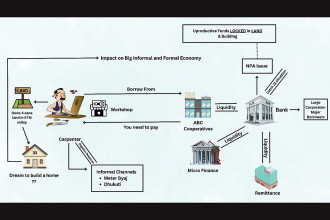
A spontaneous coffee meet-up with a couple of highly qualified development sector ‘female’ experts inspired the exploration of a whole new horizon on the give-back culture within different sectors of our society. With good few years of working on Corporate Social Responsibility (CSR)/Sustainability/Environmental, Social and Governance (ESG) for the private sector, my experiences have allowed for a more meaningful discourse on what the commonly used term ‘CSR’ is known for, and the potential it holds. Leading on to advising a progressive INGO on how best to tap potential CSR entities in Nepal, it positively stimulated an urge to further understand CSR from outside the corporate space.
For businesses and corporations, being responsible corporate citizens is not in any way limited to just giving back to the communities they operate in. CSR, a very commonly used term worldwide, is perpetually developing. CSR Version 2.0 (CSR V 2.0) is the way forward but what it truly entails is still vague and work in progress. Some of the larger corporations are definitely leading by example, but the right definition of CSR V 2.0 is undeniably evolving.
What could it mean for businesses?
Traditional CSR, mainly comprising of the ‘good to do’ activities, is a thing of the past. Transitioning from mere charity and sponsorships to a broader CSR on shared value is being touted as the future of corporate giving. The ever-changing global environment and business context progressively challenge businesses around the world to consider avenues beyond financial performances, and to incorporate social and environmental concerns into their strategic business plans to pre-empt potential risks to their businesses and create value for their organisations and beyond. The use of ESG criteria is on the rise with corporates diligently evaluating their sustainability performance more than ever. For years, businesses have primarily strived to create long lasting positive impact in the communities they operate in, but they have now begun branching out and focusing on the bigger goals of fostering inclusive growth and actively leveraging partnerships with the civil society, communities and government agencies. Progressive and transformational corporate giving seems timely for businesses as a key part of high-impact projects that truly contribute towards not just the nation but global priorities, all the while uplifting organisational reputation. The private sector seeks strategic ways to strike a balance between social impacts and business prospects, and in order to achieve their CSR goals, tactical and meaningful CSR projects and activities in partnership with credible and expert non-profit organisations is proving to be the primary strategy of choice. Consequently, companies are looking to practice and promote CSR programmes that reflect their business objectives and values while addressing social, humanitarian and environmental challenges.What could it mean for non-profits and the development sector?
For the development sector, re-visiting the traditional resource and grant model allows for unventured areas to be tapped for significant and inclusive partnerships. Development programmes opting the Public-Private Partnership (PPP) model and working with the government and the private sector have been proven to stimulate a more sustainable and scalable growth. With the ever-changing state of affairs and evolving environment (business, climate and otherwise) that we live in today, dependency on any one form of approach can mean ambiguity and risk to an organisation. The recent pandemic demonstrated numerous uncertainties and increased unavoidable interdependencies, specifically on the need to address climate change, political instabilities, inequality and other global issues. The economic crisis induced by the pandemic and prolonged government debts could mean further pressure and uncertainty on development sector budgets. Furthermore, the development sector needs to cultivate a ‘think-out-of-the-box’ working modality, particularly on new and innovative ideas that resonate with the requirements, and at times, limitations of the for-profit sector investments on social giving. Development of CSR-friendly projects can entice the private sector to invest in impactful projects, creating a sustainable win-win situation for CSR entities, non-profits and the ultimate beneficiaries. As competition on generating funds by non-profit organisations grow, it becomes critical to prioritise partnerships, credibility and visibility with communities, and with funders and nations as a whole. Hence, deep-diving into prevailing operating models could help non-profits in identifying gaps and plan and subsequently pilot innovative approaches that bear the potential to reach wider beneficiary groups and communities. A total re-think of partnership modalities and strategies could create a more profound impact in the long run. The world has witnessed multiple upheavals in the past couple of years and the time seems right to make sustainable changes and redefine CSR. The primary objective for businesses may no longer be limited to ‘good to do’ activities or ad-hoc crisis management stints for short-term reputational protection. Similarly, non-profits may not be restricted to channelling resources the conventional way, or simply utilising resources for implementation of ongoing projects. Multi-stakeholder involvement can enable all sectors to be a part of a holistic change versus the conventional approach of addressing one problem at a time. Being change agents at a global level, aligning global issues with the overarching guidance of the Sustainable Development Goals (SDGs), value add creation by learning from and adapting best practices from across the globe, to forming structures and systems and proficiencies, and interchanges of skilled human resources among others are all imperative aspects worth working on. As I look forward to more ‘CSR 2.0’ enlightening coffee encounters, I am confident, that CSR/Sustainability/ESG can change lives and beyond, and make real sustainable and scalable impacts, if sensibly and strategically shaped. READ ALSO:
Published Date: September 30, 2022, 12:00 am
Post Comment
E-Magazine
RELATED Guest Column





